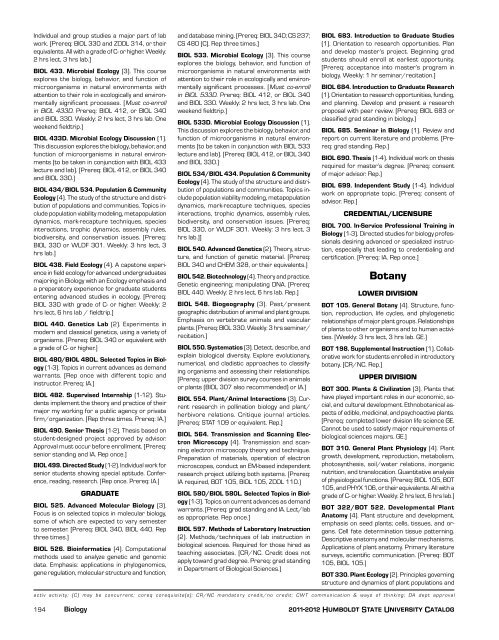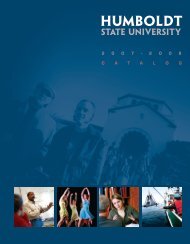2011-12 Academic Year - Bad Request - Humboldt State University
2011-12 Academic Year - Bad Request - Humboldt State University
2011-12 Academic Year - Bad Request - Humboldt State University
Create successful ePaper yourself
Turn your PDF publications into a flip-book with our unique Google optimized e-Paper software.
Individual and group studies a major part of lab<br />
work. [Prereq: BIOL 330 and ZOOL 314, or their<br />
equivalents. All with a grade of C- or higher. Weekly:<br />
2 hrs lect, 3 hrs lab.]<br />
BIOL 433. Microbial Ecology (3). This course<br />
explores the biology, behavior, and function of<br />
microorganisms in natural environments with<br />
attention to their role in ecologically and environmentally<br />
significant processes. [Must co-enroll<br />
in BIOL 433D. Prereq: BIOL 4<strong>12</strong>, or BIOL 340<br />
and BIOL 330. Weekly: 2 hrs lect, 3 hrs lab. One<br />
weekend fieldtrip.]<br />
BIOL 433D. Microbial Ecology Discussion (1).<br />
This discussion explores the biology, behavior, and<br />
function of microorganisms in natural environments<br />
(to be taken in conjunction with BIOL 433<br />
lecture and lab). [Prereq: BIOL 4<strong>12</strong>, or BIOL 340<br />
and BIOL 330.]<br />
BIOL 434/BIOL 534. Population & Community<br />
Ecology (4). The study of the structure and distribution<br />
of populations and communities. Topics include<br />
population viability modeling, metapopulation<br />
dynamics, mark-recapture techniques, species<br />
interactions, trophic dynamics, assembly rules,<br />
biodiversity, and conservation issues. [Prereq:<br />
BIOL 330 or WLDF 301. Weekly: 3 hrs lect, 3<br />
hrs lab.]<br />
BIOL 438. Field Ecology (4). A capstone experience<br />
in field ecology for advanced undergraduates<br />
majoring in Biology with an Ecology emphasis and<br />
a preparatory experience for graduate students<br />
entering advanced studies in ecology. [Prereq:<br />
BIOL 330 with grade of C- or higher. Weekly: 2<br />
hrs lect, 6 hrs lab / fieldtrip.]<br />
BIOL 440. Genetics Lab (2). Experiments in<br />
modern and classical genetics, using a variety of<br />
organisms. [Prereq: BIOL 340 or equivalent with<br />
a grade of C- or higher.]<br />
BIOL 480/BIOL 480L. Selected Topics in Biology<br />
(1-3). Topics in current advances as demand<br />
warrants. [Rep once with different topic and<br />
instructor. Prereq: IA.]<br />
BIOL 482. Supervised Internship (1-<strong>12</strong>). Students<br />
implement the theory and practice of their<br />
major my working for a public agency or private<br />
firm/organization. [Rep three times. Prereq: IA.]<br />
BIOL 490. Senior Thesis (1-2). Thesis based on<br />
student-designed project approved by advisor.<br />
Approval must occur before enrollment. [Prereq:<br />
senior standing and IA. Rep once.]<br />
BIOL 499. Directed Study (1-2). Individual work for<br />
senior students showing special aptitude. Conference,<br />
reading, research. [Rep once. Prereq: IA.]<br />
GRADUATE<br />
BIOL 525. Advanced Molecular Biology (3).<br />
Focus is on selected topics in molecular biology,<br />
some of which are expected to vary semester<br />
to semester. [Prereq: BIOL 340, BIOL 440. Rep<br />
three times.]<br />
BIOL 526. Bioinformatics (4). Computational<br />
methods used to analyze genetic and genomic<br />
data. Emphasis: applications in phylogenomics,<br />
gene regulation, molecular structure and function,<br />
and database mining. [Prereq: BIOL 340; CS 237;<br />
CS 480 (C). Rep three times.]<br />
BIOL 533. Microbial Ecology (3). This course<br />
explores the biology, behavior, and function of<br />
microorganisms in natural environments with<br />
attention to their role in ecologically and environmentally<br />
significant processes. [Must co-enroll<br />
in BIOL 533D. Prereq: BIOL 4<strong>12</strong>, or BIOL 340<br />
and BIOL 330. Weekly: 2 hrs lect, 3 hrs lab. One<br />
weekend fieldtrip.]<br />
BIOL 533D. Microbial Ecology Discussion (1).<br />
This discussion explores the biology, behavior, and<br />
function of microorganisms in natural environments<br />
(to be taken in conjunction with BIOL 533<br />
lecture and lab). [Prereq: BIOL 4<strong>12</strong>, or BIOL 340<br />
and BIOL 330.]<br />
BIOL 534/BIOL 434. Population & Community<br />
Ecology (4). The study of the structure and distribution<br />
of populations and communities. Topics include<br />
population viability modeling, metapopulation<br />
dynamics, mark-recapture techniques, species<br />
interactions, trophic dynamics, assembly rules,<br />
biodiversity, and conservation issues. [Prereq:<br />
BIOL 330, or WLDF 301. Weekly: 3 hrs lect, 3<br />
hrs lab.]]<br />
BIOL 540. Advanced Genetics (2). Theory, structure,<br />
and function of genetic material. [Prereq:<br />
BIOL 340 and CHEM 328, or their equivalents.]<br />
BIOL 542. Biotechnology (4). Theory and practice.<br />
Genetic engineering; manipulating DNA. [Prereq:<br />
BIOL 440. Weekly: 2 hrs lect, 6 hrs lab. Rep.]<br />
BIOL 548. Biogeography (3). Past/present<br />
geographic distribution of animal and plant groups.<br />
Emphasis on vertebrate animals and vascular<br />
plants. [Prereq: BIOL 330. Weekly: 3 hrs seminar/<br />
recitation.]<br />
BIOL 550. Systematics (3). Detect, describe, and<br />
explain biological diversity. Explore evolution ary,<br />
numerical, and cladistic approaches to classifying<br />
organisms and assessing their relationships.<br />
[Prereq: upper division survey courses in animals<br />
or plants (BIOL 307 also recommended) or IA.]<br />
BIOL 554. Plant/Animal Interactions (3). Current<br />
research in pollination biology and plant/<br />
herbivore relations. Critique journal articles.<br />
[Prereq: STAT 109 or equivalent. Rep.]<br />
BIOL 564. Transmission and Scanning Electron<br />
Microscopy (4). Transmission and scanning<br />
electron microscopy theory and technique.<br />
Preparation of materials, operation of electron<br />
microscopes, conduct an EM-based independent<br />
research project utilizing both systems. [Prereq:<br />
IA required, BOT 105, BIOL 105, ZOOL 110.]<br />
BIOL 580/BIOL 580L. Selected Topics in Biology<br />
(1-3). Topics on current advances as demand<br />
warrants. [Prereq: grad standing and IA. Lect/lab<br />
as appropriate. Rep once.]<br />
BIOL 597. Methods of Laboratory Instruction<br />
(2). Methods/techniques of lab instruction in<br />
biological sciences. Required for those hired as<br />
teaching associates. [CR/NC. Credit does not<br />
apply toward grad degree. Prereq: grad standing<br />
in Department of Biological Sciences.]<br />
BIOL 683. Introduction to Graduate Studies<br />
(1). Orientation to research opportunities. Plan<br />
and develop master’s project. Beginning grad<br />
students should enroll at earliest opportunity.<br />
[Prereq: acceptance into master’s program in<br />
biology. Weekly: 1 hr seminar/recitation.]<br />
BIOL 684. Introduction to Graduate Research<br />
(1). Orientation to research opportunities, fund ing,<br />
and planning. Develop and present a research<br />
proposal with peer review. [Prereq: BIOL 683 or<br />
classified grad standing in biology.]<br />
BIOL 685. Seminar in Biology (1). Review and<br />
report on current literature and problems. [Prereq:<br />
grad standing. Rep.]<br />
BIOL 690. Thesis (1-4). Individual work on thesis<br />
required for master’s degree. [Prereq: consent<br />
of major advisor. Rep.]<br />
BIOL 699. Independent Study (1-4). Individual<br />
work on appropriate topic. [Prereq: consent of<br />
advisor. Rep.]<br />
CREDENTIAL/LICENSURE<br />
BIOL 700. In-Service Professional Training in<br />
Biology (1-3). Directed studies for biology professionals<br />
desiring advanced or specialized instruction,<br />
especially that leading to credentialing and<br />
certification. [Prereq: IA. Rep once.]<br />
Botany<br />
LOWER DIVISION<br />
BOT 105. General Botany (4). Structure, function,<br />
reproduction, life cycles, and phylogenetic<br />
relationships of major plant groups. Relationships<br />
of plants to other organisms and to human activities.<br />
[Weekly: 3 hrs lect, 3 hrs lab. GE.]<br />
BOT 198. Supplemental Instruction (1). Collaborative<br />
work for students enrolled in introductory<br />
botany. [CR/NC. Rep.]<br />
UPPER DIVISION<br />
BOT 300. Plants & Civilization (3). Plants that<br />
have played important roles in our economic, social,<br />
and cultural development. Ethnobotanical aspects<br />
of edible, medicinal, and psychoactive plants.<br />
[Prereq: completed lower division life science GE.<br />
Cannot be used to satisfy major requirements of<br />
biological sciences majors. GE.]<br />
BOT 310. General Plant Physiology (4). Plant<br />
growth, development, reproduction, metabolism,<br />
photosynthesis, soil/water relations, inorganic<br />
nutrition, and translocation. Quantitative analysis<br />
of physiological functions. [Prereq: BIOL 105, BOT<br />
105, and PHYX 106, or their equivalents. All with a<br />
grade of C- or higher. Weekly: 2 hrs lect, 6 hrs lab.]<br />
BOT 322/BOT 522. Developmental Plant<br />
Anatomy (4). Plant structure and development,<br />
emphasis on seed plants; cells, tissues, and organs.<br />
Cell fate determination tissue patterning.<br />
Descriptive anatomy and molecular mechanisms.<br />
Applications of plant anatomy. Primary literature<br />
surveys, scientific communication. [Prereq: BOT<br />
105, BIOL 105.]<br />
BOT 330. Plant Ecology (2). Principles governing<br />
structure and dynamics of plant populations and<br />
activ activity; (C) may be concurrent; coreq corequisite(s); CR/NC mandatory credit/no credit; CWT communication & ways of thinking; DA dept approval<br />
194 Biology<br />
<strong>2011</strong>-20<strong>12</strong> <strong>Humboldt</strong> <strong>State</strong> <strong>University</strong> Catalog

















